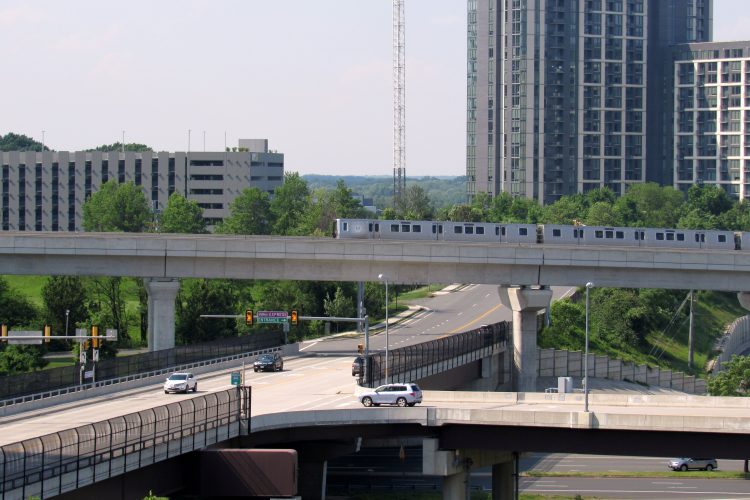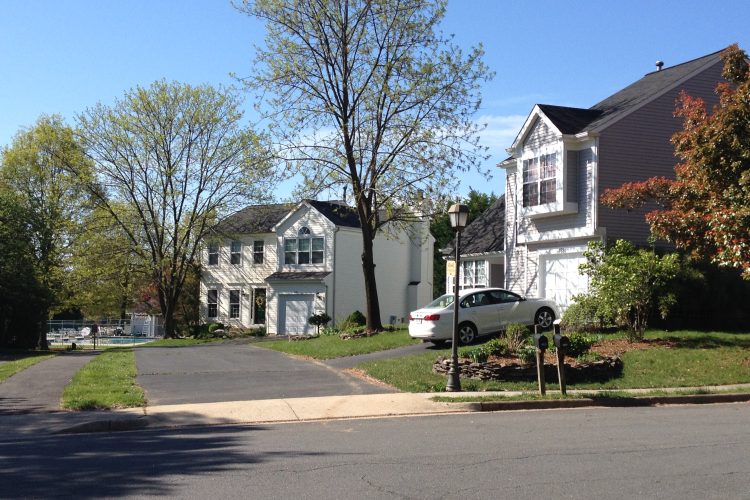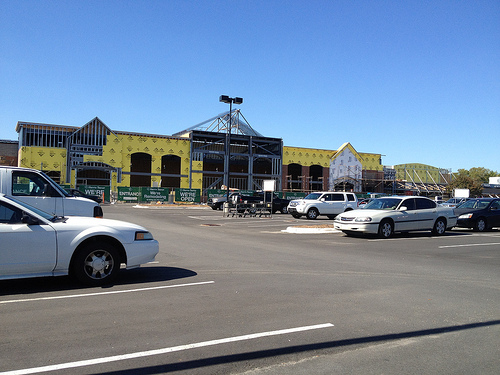January 12, 2023
Are New Rail Stations Good or Bad for Neighboring Condo Unit Owners?
Many people would beam with excitement if someone told them that a new metro station will pop up within a mile of their property. If they have a condominium or cooperative, their home ownership is full of surprises because they are in a business relationship with strangers. Are new rail stations good or bad for neighboring condo unit owners? Decades ago, the Northern Virginia communities of Tysons, Reston, Herndon, Dulles and Ashburn developed around transportation infrastructure that allowed residents to easily commute to Washington, D.C.. Local streets and the Dulles Toll Road connected these homeowners to Metro’s orange line. The lower density in these communities reflected demand for quiet neighborhoods and the lack of immediate rail transport. In time, the region suffered a crush of automobile traffic. Addition of housing congests key roads. Regional leaders teamed together to bring in the silver line. Opening in 2014, Phase 1 extended the metro from Falls Church to Tysons Corner and portions of Reston. Phase 2 extended to Herndon, Dulles Airport and Ashburn. Phase 2 opened in November 2022. The extension of the silver line did more than allow more people to access public transportation closer to their homes. This new infrastructure impacted the property owners whose properties are within walking distance. Such lands became significantly more valuable. The silver line prompted local government to change the way they regulate development. Because of rail extension, more density became possible. Anyone who drives along the Dulles toll road or elsewhere along the sliver line can see construction cranes and large trucks bringing materials.
Construction of Silver Line Rail Stations: A casual observer might conclude that these changes present a financial windfall (or at least a new convenience) to anyone with land located within a mile of any new station. However, reality it is not so simple when you have dozens or hundreds of co-owners. Decades ago, many properties in Tysons, Reston, Herndon, and Ashburn were developed as residential or commercial condominiums. The builders did not plan for the construction of new metro stations where they now appear. Most of the owners who purchased units in these condominium associations did not anticipate how the addition of a metro station would later change their communities. Many of these condominium unit owners rely upon their units as their primary housing or business location. As families and businesses grow, they become more settled in. Humans naturally resist being kicked out to suit the interests of others.
Other people have their own reasons for wanting to embrace the changes. Some unit owners may already be ready to sell. Potential buyers see old buildings cluttering valuable land. Redevelopment may add taller buildings.
This tends to divide condominium associations into factions. Many unit owners want to go using the properties they chose to buy, and do not want to be pushed out. Successful people purchase their homes or locate their businesses for thoughtful reasons. There are specific reasons why a particular condo unit might be ideal for aging in place. If they wanted a temporary arrangement, they would have just signed a lease. When developers eye these pieces of land that happen to have people living or working in them, there are usually some association members who would rather sell the property to a developer now at market rates. Some see no reason to continue to maintain the aging structures as neighboring buildings are torn down and holes are filled with newer, larger buildings. However, there are numerous reasons why a unit owner’s share of the proceeds of a termination sale might be inadequate. For example, specialized health professions require expensive buildouts to make use of generic condominium units. County planners don’t really understand the value of or needs of “light industrial” land uses.
Dramatic Assessment Increases: For silver line condominium unit owners, the construction of the rail stations is not the only complication. In 2022, the General Assembly directed the Department of Professions and Occupational Regulation to establish a Work Group to develop recommended legal reforms for condominiums and HOAs. The legislature did this out of a concern that many communities need major renovations to avoid structural failure or repairs to present building system failure. On November 23, 2022, I posted an article to this blog, “Virginia Structural Integrity and Reserves Work Group.” The work group will probably recommend reforms which will lubricate the process of condominium termination, sales, and deconversion. Also, the Work Group will probably recommend legal reforms that will encourage boards to collect more money and spend that money on capital improvement projects. If fulfillment of such requirements is opposed or unsuccessful, many communities may slide towards condominium termination.
Problem of Inflation: Things are more expensive now. While the Washington, D.C. metro area has a strong real estate market, inflation impacts condominiums more than single family houses. Rising interest rates put downward pressure on sales. Inflation drives up the cost of labor and materials for construction projects. My June 6, 2022 blog post, “Renovation of Condominium Limited Common Elements” discusses how such projects are financed and managed.
Baby Boomers on the Move: The perfect storm has yet another factor. Many baby boomers have already retired or are planning to change their careers. When workers retire or shift their careers into a new phase, their interests in property refocuses. The nature of condominium unit ownership presents particular challenges to retirement age owners, which I discussed in my October 20, 2022, post, “Are Condominium Units Good for Retirement-Age Buyers.”
How Condominium Termination Rules Work: Condominium law provides procedures to bring an end to the condominium, sell the entire property and split the proceeds. This is called condominium termination or deconversion. What many people don’t understand is that if a certain amount of support exists, then the opposing unit owners can be kicked out of their units and given a share of the sale that was not negotiated with their consent. I blogged in more detail about the mechanics of condo termination in a May 14, 2015 post, “You May Be Targeted for Condominium Termination” and on February 6, 2020, “Proposed Virginia Legislation Would Empower Developers to Oppress Rights of Unit Owners in Sale of Terminated Condominium Developments.” The statutes provide few protections to insure that unit owners will obtain fair market value in termination or other considerations of their unique situation. The developer and their friends on the board tend to “drive the bus.” The statutes assume that free-market forces and the democratic governance of the association will protect the unit owners rights. However, the business of a community association is rife with conflicts of interest. Depending upon how the termination is conducted, an individual unit owner may experience a windfall or, in some cases, financial ruin.
The Virginia Condominium Act (Va. Code § 55.1-1937) provides “default” termination procedures. In residential developments, termination requires a 4/5 (80%) agreement among unit owners, or such larger majority as the instruments may specify. If no units are residential, the instruments May specify a majority smaller than 4/5 (80%). Termination is achieved by a written contract that provides for the termination of the condominium association, the sale of the property to the buyer, and the disposition of the proceeds. The real estate industry succeeded in convincing the General Assembly to streamline condominium termination to make it easier to force the sale of the units. Things get complicated when the unit owner has a mortgage that exceeds the value of the proceeds for that unit or a long-term lease.
As interest in deconversion grows, the proponents may try to use nondisclosure agreements to control the flow of information. The proponents of termination may seek to amend the declaration or bylaws to facilitate termination. Officers or directors favoring termination sale may neglect repairs or allow reserves to deplete, or they may aggressively pursue renovations because that increases the purchase value of the property. Typically interested purchasers will buy at least one unit so that they can participate in the meetings of the association as a member, or they will work closely with allied members. This can disrupt ordinary life and interfere with a family’s ability to make plans.
What can unit owners whose condominiums are located near a new rail station do to protect their interests? There are many options, including:
- Selling one’s unit before change accelerates.
- Communicating with one’s state or county elected officials about pending or anticipated legislation or ordinances.
- Litigation with the condominium association if they breach the statutes or bylaws.
- Developing alliances with other unit owners to elect friendly directors, put pressure on the board, or bring certain petitions for vote by the membership at a special meeting.
- Stay informed about things that are happening in the community.
Are new rail stations good or bad for neighboring condo unit owners? There will be loud, poorly informed voices in the community that will make themselves heard. If a condominium association is going through a major dispute or transition related to capital improvements, special assessments or a termination, such matters are usually too complicated to handle on one’s own, because there are multiple technical issues. On the legal side, an attorney is necessary to review the declaration, bylaws, amendments and the statutes to determine if what the proponents or an amendment or termination agreement is legal. Cowherd PLC leverages experience in these matters so that the unit owners can protect their own interests in an ecosystem where large groups of people and money can threaten their plans and peace of mind.
October 13, 2021
Problems with Pipestems
The value of various features of subdivision development can be evaluated by whether they makes people happy or leads to acrimony. The value of property is inextricably intertwined with its use potential. Generally, where there are few disputes among the owners, this may indicate that the developer did something right in creating the community.
May 20, 2021
Making Property Decisions as the Region Reopens
On May 14, 2021, Virginia Governor Ralph Northam lifted the indoor mask mandate in light of updated CDC guidance. Governor Northam also declared that the indoor capacity restrictions and distancing restrictions will ease, effective May 28, 2021. The District of Columbia and neighboring states are also lifting restrictions, effective around the Memorial Day weekend.
July 28, 2016
Walking on Sunshine
Americans are increasingly frustrated by federal, state, local and HOA officials making decisions in secret. On the floor of the nominating convention, supporters of Senator Bernie Sanders protested Hillary Clinton’s undisclosed collusion with the Democratic Party leadership during the presidential primary. On the Republican side, Donald Trump continues to refuse to disclose his tax returns. Democracy doesn’t work unless voters, boards and legislators can make informed decisions. Virginia already has “sunshine” laws on the books to safeguard “open government” on the state, local and HOA levels. These laws mandate freedom of information and often have a beneficially deterrent effect. As Katrina and the Waves sang in their 1980’s hit, “I’m walking on sunshine, and don’t it feel good!” Property owners feel good when they can observe, understand and react to decisions that affect them. Many decry the “partly cloudy” forecast for “open government.” Property owners often struggle to resolve impasses with HOAs, land use officials and construction contractors. In many cases owners can use “open government” laws as a tool to seek favorable outcomes. As an attorney, I seek documents and information from whatever sources are available to help clients. Owners “walking on sunshine” make better decisions.
Developments at a July 15, 2016 Loudoun County Board of Supervisors meeting illustrate how confusing and frustrating “open government” rules can be. Harris Teeter Properties, LLC obtained permission to open a grocery store in Aldie, Virginia. Harris Teeter wanted the Board of Supervisors to deny requests for three neighboring restaurants. This would allow them to plant their largest store in one of Loudoun County’s Transition Policy Areas. “Transition Policy Area” is a land use designation “incorporating an innovative blend of rural and suburban development features.” Under the Board’s official policy, Aldie is a border-town of sorts between Northern Virginia and rural areas. These competing retail proposals are for development along this fault-line. If a mega-grocery store comes to Aldie, shoppers will drive there from all over. Aldie folks were mostly fine with getting a regular Harris Teeter. They have to eat. The Board of Supervisor’s Transportation & Land Development Committee considered these controversies. Although he was not on this Committee, Republican Supervisor Tony Buffington took a keen interest because he represents the Aldie district. Many of his constituents fear that an expanded Harris Teeter proposal would create traffic congestion, destroying the hamlet’s rural identity. Some questioned the Board of Supervisor’s commitment to its overall plan for land development. The Loudoun Times quotes Gem Bingol of the Piedmont Environmental Council as saying, “The question I see facing you is, ‘Are you going to support your Transition Policy Area policies?’” Supervisor Buffington’s day job with the U.S. Capitol Police took him on the day of the committee meeting away to the Republican National Convention in Cleveland, Ohio. From the GOP convention, Buffington texted Supervisors at this committee meeting. He was “against everything they [Harris Teeter] are currently proposing.” He shared that the “residents are adamantly opposed to the proposals.” He and a group of other Supervisors carried on a lengthy discussion text message on what to do about the Harris Teeter proposals.
Randall Minchew, the lawyer for Harris Teeter, noticed that the Supervisors were all very active on their cell phones during the Committee hearing. Mr. Minchew asked if Buffington was texting them. The other Supervisors read their texts with Buffington into the official meeting record. Minchew accused the Supervisors of a “blatant” Virginia Freedom of Information Act violation. Mr. Minchew’s appeal to the open government laws at least gave him and the grocery an opportunity to respond to criticisms submitted off the record. However, VFOIA can’t really be used make the Board to give the grocery the decision they want.
Loudoun County Attorney Leo Rogers reviewed these text messages. Rogers, in consultation with the Virginia Coalition for Open Government, reached an opinion that the Buffington-instigated texts did not violate the FVOIA:
First, given that the text messages were exchanged between only two Board members, there was no participation in the meeting itself. A public meeting of the county’s elected body is defined under FOIA as a meeting of three or more Board members.
Second, in order to be an electronic communication under FOIA, there needs to be an audio or visual component, which the text messages did not include. In any event, in order for a FOIA violation to be actionable, it must be done “willfully and knowingly,” and there is no evidence that is the case.
Of course, Mr. Rogers only speaks in his role as an advocate and advisor for the County. Harris Teeter could try to bring a legal action in court to obtain a ruling. However, what Harris Teeter wants is to gain an edge on its competitors in the mega-grocery field. They are more interested in the ultimate decision that the Board will make than a mere FOIA issue. After the incident, Buffington publically expressed regret that his actions may have caused a perception of wrongdoing by the public.
County supervisors and other elected officials reading the opinions of the county attorney and FOIA council are probably breathing a sigh of relief. Undoubtedly, board members everywhere make all sorts of communications with one another that it would be unduly burdensome and unnecessary to put on the record. The Harris Teeter hearing illustrates why it pays to make inquiries to find out what off-the-record communications shape governmental decisions that affect how many people a grocery store will give jobs, serve goods or delay commutes. The same can be said for HOA and condominium board and committee deliberations.
The Transportation & Land Use Committee hearing was broadcasted. Mr. Buffington or any other interested party could stream it on their computer or mobile device. Lawyers represented the interests of Harris Teeter and Loudoun County. Local newspapers quickly covered the scoop for the interest of county voters. At stake is the identity of one of the fastest growing counties in the nation. In this instance, the recording and inquiries allowed the threats to transparency to be quickly addressed.
In many condominiums and homeowners’ associations, these safeguards do not practically exist. HOA board and committee meetings aren’t broadcast on television. Meetings are recorded in brief minutes, if at all. The news media are unlikely to commit personnel and resources to covering HOA controversies unless something juicy erupts. Owners rarely bring legal counsel to HOA hearings. Owners frequently complain that their Board’s ruling clique keeps them in the dark. The Virginia Property Owners Association Act and the Condominium Act contain statutory protections of the integrity of HOA meetings and owners’ rights to review records. Although most Associations would rather simply disclose the requested meeting records than defend an owner’s lawsuit, few owners take advantage of their rights. On a practical level, the association president, board majority, Association lawyer and property manager make many decisions without the “open government” sunshine that many owners want. HOAs present themselves to state and local policymakers as mini-governments that relieve county budgets from service obligations in entire communities. For many people, their neighborhood community is the least transparent “government” making decisions that affect their lives. It should be the other way around.
VFOIA is a useful tool for property owners in construction cases as well. Contractors must obtain county approvals and inspections throughout the construction process. The local government maintains records of all of these applications, permits, inspections, correspondence and other documents. Owners can use VFOIA requests to find useful information for construction disputes with the builder.
Property owners don’t have to be big grocery store chains to protect their rights and get their voices heard before their local elected government officials and HOAs. HOA and local government boards and committees have legal counsel and managers on their team. Owners need to have a “team,” which could consist of like-minded neighbors, sympathetic board members, attorneys, CPAs and others. With help, owners can understand the laws and governing documents. “Walking on sunshine” can help owners protect their rights and make smart decisions.
News Articles:
Selected Virginia Statutes:
Virginia Freedom of Information Act
Va. Code § 13.1-933. Inspection of records by members (Virginia Nonstock Corporation Act)
Va. Code § 55-79.74:1. Books, minutes and records; inspection (Virginia Condominium Act)
Va. Code § 55-79.71:1. Use of Technology (Virginia Condominium Act)
Va. Code § 55-510.1. Meetings of the board of directors (Virginia Property Owners Association Act)
Va. Code § 55-515.3. Use of Technology (Virginia Property Owners Association Act)
Photo Credit:
Harris Teeter Quail Corners Charlotte, NC via photopin (license)
May 17, 2016
Can a HOA Represent Individual Landowners in Court without Their Permission?
Can a HOA Represent Individual Landowners in Court without Their Permission? What gives an HOA or Condo Association standing to sue to address threats coming from outside the community, or to appeal administrative decisions by the government that affect the neighborhood? On April 22, 2016, the Circuit Court of Loudoun County issued an opinion that explains how an HOA’s power to represent its owners in the outside world is actually quite narrow. This case is important to anyone interested in the overreach of HOA powers. In matters involving real estate, the HOA only owns the common areas and easements granted in the covenants recorded in the land records. For an HOA to represent the interests of an individual owner’s property in court, specific authorization is required.
The Grenata Homeowners Association and the Evergreen SportsPlex are neighbors. Grenata is a 61 lot community in Leesburg, Virginia. Like many sports complexes, Evergreen SportsPlex uses powerful lighting to make its ballfields usable at night. In many places, sports complex lights are intense enough that passengers taking off or landing can see games in play from airplanes from a high altitude at night. Many people in Grenata find the glare from the Evergreen SportsPlex a nuisance. Personally, I dislike having streetlight glare come into my bedroom or hotel room at night. Loudoun County has a light ordinance that does not require residents to do this where the light problem reaches a certain point. I can understand why those owners brought complaints before Loudoun County, alleging that Evergreen SportsPlex violated the local light ordinance. (Pop star Cory Hart’s 1984 hit song, “Sun Glasses at Night” is the musical inspiration for this blog post) The zoning administrator issued a notice of violation. Evergreen SportsPlex appealed and the Board of Zoning Appeals reversed the decision, finding that the Evergreen SportsPlex lighting was compliant. The HOA and some of the individual owners appealed this adverse decision to the Circuit Court. The April 22, 2016 opinion of Judge Douglas Fleming rules on the County’s efforts to get the appeal dismissed without further litigation.
Much of Judge Fleming’s opinion addresses technical questions about whether the HOA or individual owners were effectively notified of the Board of Zoning Appeal’s decision and thus waived any right to appeal. The case also presents questions about Grenata HOA’s standing to appeal the Board of Zoning Appeal’s adverse decision on behalf of itself and its individual owners. Has Grenata rightfully interjected itself in this case if it is the individual owners who are impacted by the intense glare? There may be owners in the HOA who are not damaged by the SportsPlex lighting and would not stand to benefit from this litigation. The Court addressed Grenata’s claims of standing both as a property owner and as an owner representative:
HOA as a Representative Agent of Individual Homeowners:
Grenata HOA claimed to be an authorized representative agent of individual homeowners affected by this Board of Zoning Appeals decision. There are provisions in the covenants that authorized the HOA to bring lawsuits that the board deemed necessary. The Board of Directors made a written resolution specifically authorizing the appeal to be filed. The opinion does not discuss any provisions in the covenants that would specifically authorize the HOA to litigate on behalf of individual owners’ interests.
If Grenata succeeds on appeal, the owners living closer to the SportsPlex would benefit more than the ones living further away. All owners would be paying for this out of their assessments.
There is no provision of the Property Owners Association Act that specifically authorizes HOAs to appeal adverse land use decisions on behalf of individual “constituent” owners.
The Court found that there was no record in the Board of Zoning Appeal case that individual affected homeowners ever expressly authorized the HOA to pursue this appellate litigation on their behalf. However, since Grenata alleged in their appeal that there was, the Court viewed this as a factual dispute that would have to be resolved later on in the case.
The Court is making a subtle point about the limits of HOA powers. Just because a HOA Board of Directors decides that they want to pursue an appeal of a land use decision on behalf of several of their constituent owners doesn’t mean that they have the authority to do so. Only those individual landowners have standing to pursue the litigation unless they expressly authorized their HOA to do this. The language in the covenants is critical to assessing these authorization issues. The covenants could prohibit such actions by the board, with or without owner’s authorization, or they could provide specific circumstances where the HOA could do something like this without individual owner authorization. The analysis applied by the court appears to be in a situation where the covenants are silent on the issue.
In these types of cases it is usually best for the affected owners to retain their own counsel (either separate or joint representation, as appropriate) and explore these matters without involving the HOA. If an individual owner signs an authorization for the HOA to proceed, and the HOA Board is motivated to proceed, then the owner runs the risk that the HOA Board will pursue things in a manner in the interests of certain officers, the majority of HOA directors or owners. This could result in an outcome that might not be in the best interest of the affected owner. Also, many owners may be suspicious if the Board pursues legal action that is paid for by all owners but disproportionately benefits certain owners, who may be connected with board members. The case opinion does not delve into these internal HOA governance issues, so I don’t know if they come into play here.
HOA as an Impacted Property Owner:
Grenata HOA owned a few parcels of land approximately 480 feet from the SportsPlex, including a water supply and undevelopable “out-lots.” Grenata argued it had standing because it owned these nearby properties. The Supreme Court of Virginia has a test as to whether a neighbor has standing to challenge a land use decision:
- The neighbor must own or occupy property within close proximity to the property at issue (here the SportsPlex), thus establishing a direct, immediate, pecuniary and substantial interest in the decision.
- And they must demonstrate a particularized harm to some personal or property right, or a burden different from that suffered by the general public.
The County unsuccessfully argued that these common areas did not adjoin the SportsPlex and thus were not in close proximity. The court found that 480 feet was close enough to allow the appeal process to proceed. On argument the County pointed out that these common areas were undevelopable and thus of little or no market value. The Court determined that such value was not relevant to this determination. The court determined that the HOA had standing to pursue the appeal on the grounds because it sufficiently alleged that it was a proximate owner alleging a particularized harm not suffered by the general public.
A cheeky argument that lawyers for Evergreen Sportsplex or the County could make, but isn’t discussed in the opinion is that the SportsPlex lights actually confer a benefit on the HOA in its administration of the common areas. HOA’s have an obligation to their residents and guests to keep common areas well-lit if necessary to promote safety. If there is an area where storm runoff accumulates, or parking lots or perhaps some roads, it may benefit the community to have electric bills for lighting paid by Evergreen.
The Grenata case is far from over. The Circuit Court may ultimately dismiss the appeals of the HOA, individual owners or both. In Virginia, the factual determinations of the Board of Zoning Appeals are presumed to be correct by the Court unless a party successfully rebuts the presumption. The burden rests on the HOA and owners to show that the Board of Zoning Appeals made an incorrect determination.
Case Citation: Grenata Homeowners Association, et al. v. Bd. of Superv. of Loudoun Co. & EVG Land, LLC (Loudoun Co. Cir. Ct. April 22, 2016)(behind subscription paywall)
Photo Credit: Flood lights via photopin (license)
February 12, 2014
Court Sentences Son for Storing Inoperable Vehicles at Mom’s House in Harrisonburg
I grew up in a rural county in Virginia. Seeing broken-down cars parked in front of a house was part of the landscape. The perfect backdrop for the Blue Collar Comedy Tour. If you are waiting to get the money to fix it, where else would you store a car that doesn’t work?
In college, a friend of mine lent me his car. A tire went flat in a church parking lot. The church got tired of having a broken down car out front, week after week. The priest and I tried to change the tire. No matter how hard we pried, we just couldn’t get the wheel off. Later I learned from the owner that the wheels were welded on! I then felt like less of a wimp.
A car can be the apple of the owner’s eye. But when vehicles break down, they become an eyesore to the community. Many local governments have zoning ordinances against storing multiple inoperable vehicles outside homes without a covering screen or wall. Harrisonburg, Virginia, a college town in the Shenandoah Valley, has one of these ordinances.
The City of Harrisonburg convicted Terry Wayne Turner of violating a zoning ordinance by storing four inoperable vehicles on property owned by his mother. Terry owned the four vehicles. Although he lived with his mother, he did not own or lease her property. Harrisonburg cited him with a zoning violation for storing the four inoperable vehicles. Terry Wayne Turner v. City of Harrisonburg, No. 1197-12-3 (Va. Ct. App. Oct. 8, 2013)
At trial in the Circuit Court of Rockingham County, Terry argued that he was not liable under the zoning ordinances because he did not have title or lease to the property where he stored the cars. He argued that he was not a proper defendant in a land use case because the regulations apply to real property and their owners, not personal property like automobiles. The Court convicted Turner of a misdemeanor, ordered him to remove the vehicles and sentencing him to jail time and probation.
Mr. Turner appealed this conviction to the Court of Appeals of Virginia. He conceded that the storage of the vehicles rendered the property non-compliant with the land use restrictions. Turner focused on the fact that he was an invitee, and not an owner or tenant of his mother’s home. He argued that the scope of the zoning ordinances cannot extend to the ownership of personal property like automobiles. The Court of Appeals noted that zoning laws regulate the use and occupancy of land, not merely its lease or ownership. The ordinances do not contain specific limitations to owners or lessees of real estate. “Any person…found in violation of this chapter… shall be guilty of a class 1 misdemeanor.” The Court observed that if someone conducts a zoning violation on the property of another, that could thwart the purposes of land use restrictions.
On appeal, Mr. Turner brought up a new argument that his mother, not him, is the proper defendant in this case. She was the one who properly held a duty to make the property conform to the zoning regulations. The Court refused to consider this argument because Turner did not preserve it for appeal by presenting it to the trial judge. It is difficult from the text of the opinion to determine what role, if any, his mother played in this dispute. The Court may have found a belated attempt to shift the blame onto a family member unsavory.
Turner provides some food for thought:
- What renders a car “inoperable” for purposes of a zoning inspection? A road test? A log of how long it as been since it was moved? Removal of license plates or certain parts? Signs of wear?
- If buying a functioning car, paying for storage or taking the inoperable car for extensive repairs is outside a family’s budget, how can they maintain ownership of an automobile until they have the ability to repair it?
- Which is a greater eyesore in a residential neighborhood: (a) inoperable vehicles, or (b) walls or screens covering the area where they are parked?
- Can similar ordinances provide leverage against owners who abandon inoperable vehicles on commercial property?
- Generally, how far can zoning laws reach beyond the owners and improvements of the property to non-real estate matters before they infringe on civil liberties?
Terry Turner filed a Petition for Appeal with the Supreme Court of Virginia. As of this blog post, the Supreme Court has not yet decided whether to allow further appeal.
photo credit: lewsviews via photopin cc (Does not depict Mr. Turner’s vehicle – apparently this photo was taken in Rappahannock County)






